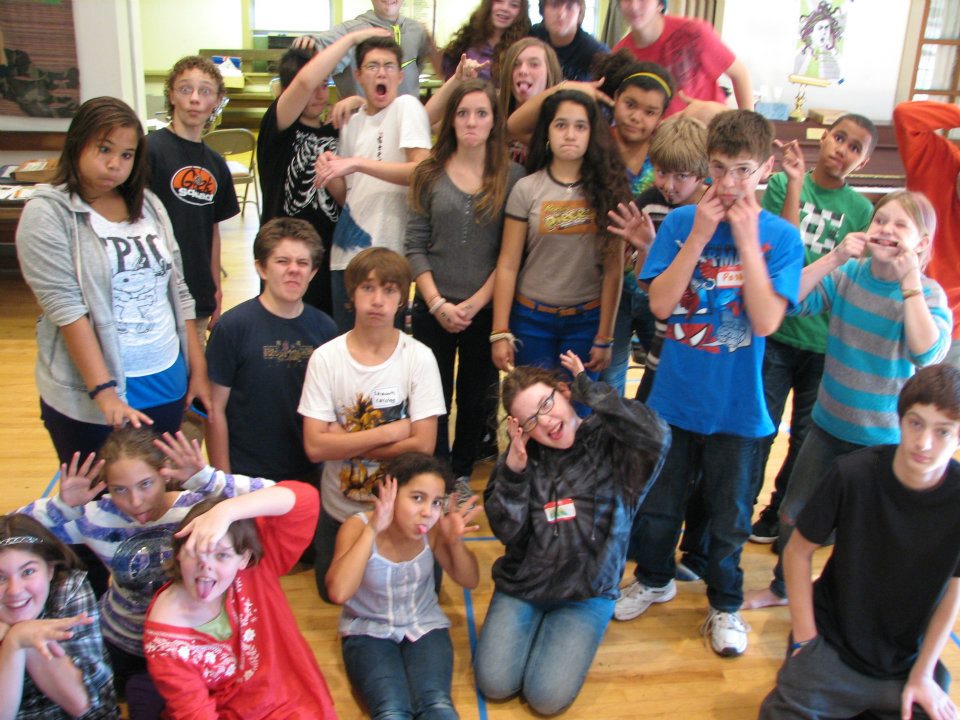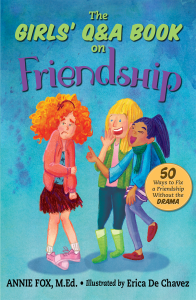|
|
May 21, 2014
 Let’s figure out this friendship stuff together This is part 2 of the very cool Skype in the Classroom session I had Monday with a class of Philadelphia 8th graders. (Here’s Part 1) I’m all about giving students ongoing, safe places to get real about the challenges of friendships. It’s important to their personal well-being and to a positive school climate.
Student: Annie, what if you have friends who act cool when they’re with you but other times, when they’re with other people, they act really different with you?
What have you tried so far?
Student: I ask them, “Why do you act different with your friends than when you’re with me?” And they said, “I don’t know what you mean!”
All of that “I don’t know what you’re talking about!” is B.S. What you’re describing is The Switcheroo. When it’s just you and your friend, things are cool. Then you add one or two other people and suddenly you’ve switched channels and I don’t even know this person who is supposed to be my best friend. I’m wondering, “Why are you treating me this way?!”
Props to you for asking him what was going on. That was very brave. Most people would feel bad about the way they were being treated in, but they aren’t likely to talk about it. You took the extra step and I have a lot of respect for you.
So you asked your friend about it and he said, “I don’t know what you’re talking about.” That wasn’t true. He knew exactly what you’re talking about. But he didn’t feel proud of the way he’s been treating you, so he wouldn’t admit it.
If that happens again, I suggest you find the EXIT. You may not have ever thought of this, but there is an exit for every friendship. And sometime you just have to give yourself permission to walk through it. You can leave without making a big announcement. You can just say, “I’ll catch you later.” And you leave and spend time on your own doing thing or you hang out with other friends who treat you with more respect, or you take your dog for a walk. Whatever it is, just leave. Because there is no reason to stay with people who are not treating you well. Zero reason. Don’t do that.
Exactly how long do you stay away from this friend or friends? That depends. You could take a short vacation and the next day your friend may ask why you left. Be honest. You can say, “When you’re with other people you don’t treat me very well, so I left.” That gives him something to think about. And maybe the next time he’s with you and other people, he’ll treat you better. Or he won’t.
Sometimes, though, you go through the exit and you never come back to the friendship. And that’s ok too. Sometimes you end a friendship because you’ve outgrown it or because you get a new idea about how you want to be treated. It’s all ok. Just don’t talk about the person after you’ve gone through the exit. That’s not cool. It’s just gossip. Not important.
Before we ran out of time I asked the students what they usually learned in this class with this teacher. And they told me they learned math and science. This wasn’t the answer I expected, so I asked the teacher why he wanted his students to get a Skype lesson on Real Friends vs the Other Kind.
Teacher: We meet once a week, on Monday mornings, and have open discussions where people talk about their lives and share. And friendship is an important topic for us to talk about.
You guys are very lucky to have a teacher who prioritizes this stuff. Someone who says, “This may not be math or science, but it’s important. And I want to give you a platform to talk about it.” That’s awesome. There are not enough teachers like this one. You’re very lucky.

May 19, 2014
Since September I’ve been doing Skype in the Classroom sessions about Real Friends vs the Other Kind with 3rd-10th graders. (Even did one in Croatia!) Today I beamed into an 8th grade class in Philadelphia. Here are some of those students’ questions along with my answers. I’m sharing them to let you know that you are not alone in dealing with any of this stuff.
Student: What would you do if you had a friend you couldn’t trust but you were trying to give them a chance?
 We’re just a bunch of kids trying to figure out this friendship thing It’s good to give someone a second chance. We all make mistakes, right? Sometimes we’re in a bad mood and we’re rude. Sometimes we’re trying to impress other people and we end up hurting a friend. Before you give someone another chance, though, you have to talk about what happened. You can say, “What you did made me feel like I can’t trust you. I want to give you another chance, but first tell me what the heck was going on when you did that?!” A real friend will stop and think. They’ll say something like this: “I’m really sorry. This is why I did it. I promise I’m not going to do that again.” Then you can say, “Cool” and you move forward in the friendship.
But if your friend says, “I don’t know what you’re talking about!” They’re not taking responsibility for what they did. Even though you may want to trust them again, you haven’t really cleared up the problem. They don’t seem to understand what they did and why it wasn’t OK. Chances are good, they will do it again. If you still want to give them another chance, proceed with caution.
Student: If you’re friends with someone and you know that they’re talking about you, what should you do?
You can’t pretend that you don’t know it, so you have to talk about it. But watch your attitude. If I’m angry and I go my friend and say: “Hey, I heard that you’re talking about me. What’s up with that?!” your friend will feel attacked and will defend him or herself. They may say, “I don’t know what you’re talking about” when they actually know exactly what you’re talking about. Or they may be innocent and ask, “Who told you that?! It’s not true!” Maybe the person who told you was lying because they wanted to mess up your friendship. Bottom line here, if you need to talk to a friend about something important, get the facts first and don’t come out fighting. If you know the truth, calm down and say, “I know you’ve been talking about me and it makes me feel like you’re not a real friend.” Then you close your mouth and you listen to what they have to say. Afterwards, decide what’s right for you to do in this friendship.
Student: Have you ever felt like if you didn’t have a friend you weren’t like… normal?
There were times when I didn’t have a real friend. (That’s the only kind worth having.) It’s OK not to have friends if you know that you are friends with yourself. Being cool with who you are lets you be cool with spending time on your own. That’s way better than hanging out with people you don’t trust or respect. Not having a friend can be lonely and sometimes you might wonder, “What’s wrong with me? How come I don’t have at least one person who I’m really close with?” There’s nothing “wrong” with you. It might just be that the people around you are not a good match for you and for the kind of friend you are looking for. It may be that you’ve got high standards for yourself and for the people you call your friends. That’s a good thing.
If you aren’t finding real friends at school, look outside of school. At an afterschool club. Or a youth group. Or at the park. Just talk to people. I used to go to the library a lot when I was in middle and high school. There were kids there from other schools and I got to be friends with some of them.
If you need new friends or more friends… first you need to know what a real friend is. Make a list of what makes a Real Friend. Use it as your “shopping list.” For example, respect is a really important trait in a friend. You may see someone and say to yourself, “Is this person respectful? I don’t know him or her yet, but do I like what I see in the way this person treats others? Would I want a friend who treats me that way?” Think about what you’re looking for and keep your standards high, for yourself and for other people.
I hope this helps, and tune in next time, for Part 2 of Friendship Issues from the 8th grade. Til then, be a good friend to yourself and others.

April 8, 2014
 I’m trying hard, Dad, but I’m just not perfect All parents want their kids to succeed in school. But what does the word “success” mean to you, as a student? Do you know? Is it all about getting a 4.0 GPA? Being accepted into a top-tier college? Getting a high-paying job so you can buy great clothes, an awesome car and (some day ) and equally amazing house? When it comes to actually defining “success” are you and your parents on the same page? If there’s a possibility you’re not and/or that you and your parents might need to to e-x-p-a-n-d your definitions, check out Challenge Success, where students, parents and schools are learning there are many many ways to be successful in life.
But when a parent’s definition of success equals: “All A’s and nothing less,” life can become way more stressful than it needs to be. Take, for example, this email from a high school student who seems to be cracking up under the strain of his parents’ pressure to be “perfect.”
Hey Terra,
My parents are super successful and push me to be like them. Not only do I have get straight A’s, I also have to get 100% on all tests. If I don’t they take everything from me till I get them. It’s impossible to get 100% in everything. Now all I do is obsess about schoolwork. In fact, everything I do has to be perfect. If there’s a stain on my shirt I spend the entire day trying to get it out. If I have a zit I can barely stand being out in public. I think I’ve become a perfectionist and I hate it. I have no friends any more because I’m just soooo focused on everything else. My parents think I’ve got a great attitude, but it’s a curse to have to have everything be absolutely perfect. Can I change? – Too Perfect
Dear Too Perfect,
You’re right, it is impossible to get 100% in everything. Human make mistakes. It’s how we learn. Your parents are holding you to unrealistic expectations. They have good intentions, but you seem to have reached a point in your life where you are a) unhappy with your need to be perfect and b) would like to make some changes in yourself. The good news is that you can. Talk with a counselor because these behaviors (the compulsion to “spend the whole day trying to remove a stain on your shirt”) are deeply rooted and hard to change without help from a trained professional. Either you can talk honestly with your parents and tell them what you think and feel or you can just walk into the school counselor’s office and be honest with him or her.
Hey Terra,
My parents are fully aware of my perfectionism and they have told me that’s it’s good for me. That there’s nothing wrong with striving to be perfect. So they’re in another world. I don’t want to see a counselor because I can’t have a flaw and needing to see a counselor is a flaw. You know, I used to be a normal guy who had fun and friends. It’s just gotten out of control. I’m a neat freak now and constantly find flaws with myself. That with a need to get 100% on everything. This just sucks. I literally cried one day when I got home because I got a 98 on a test. – Too Perfect
Dear Too Perfect,
Your level of perfectionism is not a “good thing.” It’s unhealthy. This much stress will continue to make you unhappy. To get healthier talk to your parents about seeing a counselor or talk to them about lightening up or take yourself in to talk with the school counselor. btw, needing counseling doesn’t mean you are “flawed.” It simply means that you (like all humans) feel a bit overwhelmed at times (like now!) and you need some help understanding your behavior so you can lower your stress levels and be healthier. Not flawed… smart!
Hey Terra,
I’ll go and see the counselor.
Dear Too Perfect,
Smart move! Good luck.
In friendship,
Terra
PS If you want to find out more about how stress can work on your body and your brain (in good ways and not so much) check out my book for teens, Too Stressed to Think? It can help!

March 25, 2014
 We can be mean to her and still be nice, can’t we? “Do unto others” makes no sense to middle schoolers. (Ideally it should, but that’s not how TweenWorld currently operates.) To help our kids navigate the turbulent and toxic waters of peer relationships, we’ve got to wake up and smell the reality stinking up their world (online and off).
Of course both girls and boys have middle school friendship woes. And yes, both boys and girls can become Peer Approval Addicts. But girls often take their feelings of hurt, jealousy, betrayal and rejection to dramatic and damaging heights. So let’s talk about girl friendships.
The social garbage girls throw at each other is the stuff of rumors, gossip, harassment, and exclusion. And it often happens under the radar. Because even though a girl may be eviscerating a former bff at school and online, she still wants to think of herself as a nice girl. (I said it was twisted, didn’t I?)
 50 Ways to Fix a Friendship without the DRAMA I wrote The Girls’ Q&A Book on Friendship for 8-12 year olds and the adults who care about them. Let’s face it, parents are rarely aware of what’s going on on the battlefield of their daughters’ friendships. It usually comes to light when their girl feels victimized and can no longer contain her distress. At that moment she may spill the whole story of her so-called friend’s bad behavior. In response a parent might logically advise:
“Tell her how you feel about this. Tell her she’s got to stop.”
“I can’t tell her that!”
“Why not? It’s true!”
“Because it will hurt her feelings!”
“Excuse me!? You won’t tell her she’s hurt you because you don’t want to hurt her feelings?! What about your feelings?”
“Forget about it, Mom/Dad. I’m sorry I said anything. You just don’t get it.”
Bingo! Parents can’t fathom the logic here. But to the girl, the logic is clear. She will swallow her pain because she (justifiably) fears that complaining about bad treatment will cause her friend and all the others in their friendship circle to ditch the plaintiff, swiftly and completely. Our targeted daughter will be friendless and she knows it. And because that is a fate worse than death she puts up with the ongoing abuse. Pretends it doesn’t hurt. Continues to think of these girls as her friends and continues to hang out with them and be abused.
Her confusion over the love-hate/comfort-pain mix may cloud her judgment when she starts dating. If she puts up with emotional abuse in a friendship why assume she’ll choose a thoughtful caring romantic partner over one who dominates, demeans and controls?
As parents we need to help our daughters develop enough self-respect to demand respectful treatment from others, especially those closest to them. Let’s help them acknowledge the truth of what’s going on in their friendships. We won’t be able to change “mean” girl behavior in others, but we can, at the very least, help our daughters acknowledge that their pain at the hands of friends is real, undeserved and unacceptable. Then we can point out their options:
1. Stay silent. Stick with friends who hurt you and expect more of the same.
2. Talk to them about it and let them know you’re no longer giving them permission to disrespect you. If nothing changes, consider option #3.
3. Take a (permanent) vacation from the drama. Reach out to people who share your values about what it means to be a real friend.
Here’s to Real Friends vs. the Other Kind and to less friendship drama!
 — Older Posts »
| |
















